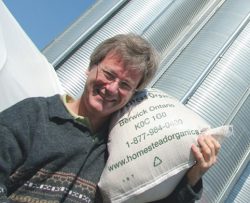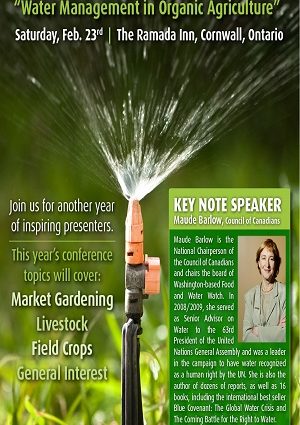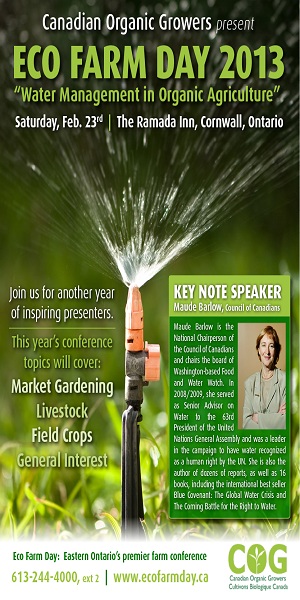“Do not listen to those who say there is nothing you can do to the very real and large social and environmental issues of our time”—Maude Barlow.

CFN– Everybody can make a difference, just not to everything at the same time. For farmers and home owners, one such battle is water management and soil health on our own property. The summer drought of 2012 reminded us all of the importance of conserving and managing water for food, farming, and fun.
A healthy soil is well balanced in its biological, chemical and physical properties. It is not degraded by synthetic chemicals or other pollution. And it provides functions such as nutrient cycling, carbon sequestration, and water retention that sustains plant and animal productivity and diversity.
Since the early 1900s, the pace of soil degradation around the world is accelerating. In North America, agricultural activities (66 percent) are the main culprits. The infamous 1930s Dust Bowl in the American Mid-West severely damaged over 30 million hectares. The two main causes were the loss of long-rooted grasses due to plowing and a drought.
Soil loss through traditional plow-based agriculture is 10 to 100 times greater than the rate at which soil is created. Often a plowed field will be disked (lightly stirred) to kill weeds as well. The fluffed-up soil loses carbon and moisture rapidly and the soil becomes vulnerable to erosion.
But there is an alternative… Organic, ecological, and conservation farming focuses more on soil development then merely reaping crops. Intensive and diversified crop rotations cycle nutrients, especially nitrogen instead of purchasing nitrogen fertilizer, and suppress pests and weeds. Cover crops or green manures retain nutrients for the next crop and add organic matter to the soil.
Conservation tillage practices build soil fertility, even with intensive farming methods, and gradually increase the organic matter in soil, as much as tripling its carbon content in less than 15 years. A mixed crop and livestock operation greatly improves nutrient cycling with composted manure going back onto the field.
So, we don’t have to save the entire world today. But we can do our part by choosing to buy sustainably-grown foods that will help preserve it for tomorrow.
“In a life of activism, you meet the nicest people, you help transform ideas and systems, and you commit to leaving the earth in at least as whole a condition as you inherited it.” – Maude Barlow.
Maude Barlow will be the keynote speaker at Eco Farm Day in Cornwall on February 23. Attend the event to hear more from this inspirational speaker and several other experts to find out how innovative organic farming and gardening can make a difference in soil and water conservation.
With contributions from Sylviane Duval.



This is a must attend event for all of our local food producers and consumers. So much to learn, share, taste….just go, bring a friend too, And please do share this information with your friends, family and co-workers. Thank you.
What pesticides and herbicides do local organic growers use?